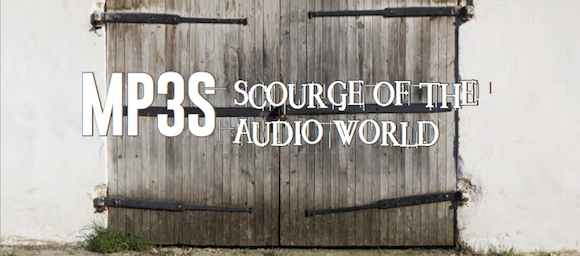News
22 Sep 2015
The Mill Report: MP3s – SCOURGE OF THE AUDIO WORLD

Subscribe to CX E-News
By rights, no-one should even remember the MP3 format by now, any more than people can remember Betamax or Hi-8 tapes in the video industry. Somewhere along the line the audio industry was sold a miserable lie that has all but poisoned our capacity to advance the hi-res digital cause.
It’s time we woke up from this nightmare and told the big companies, whose collective boot has been on the throat of high fidelity for decades, to step aside and let consumers hear music the way artists intended them to.
Down here at The Mill this month I’ve been tangled up yet again in a process that by rights should no longer even exist in this rapidly expanding 21st Century – the destruction of all our hard-won audio quality for the sake of a ’90s internet model and the tiny handful of giant companies that rack up billions in profits because of it.
Yep, I’m talking about the dirty rat that no-one seems to be able to flush down the pipes – the MP3.
Only last night I was debating it again at a fundraiser for a local FM radio station. This station, like so many others around the country, plays MP3s over the airwaves for several reasons: because the files are small enough to manage in their tens of thousands, the storage and backup is therefore cheaper, and the software can buffer the audio more easily.
“But what about the sound quality?” I asked. “Isn’t the sound of the music you play important to the station and its listeners?”
“Nup, not really,” came the response. “You can’t really hear the difference in a car anyway, particularly after the transmitters have had their way with the audio.”
Here once again was sound quality taking a back seat to convenience and process. The grand assumption that people can’t hear the difference between a hi-res audio file and its squashed tin-can facsimile was once again on display without any apparent thought given to testing or scrutinising the assertion.
So why, if this is true, do we the audio professionals bother to develop more advanced recording software and hardware in perpetuity? Why, if this is true, would anyone therefore waste their time and money on great mics, better converters, decent studio setups and sophisticated recording, mixing and mastering skills? Why, if this were true, would anyone bother producing hi-res audio products at all?
Because the differences are massive, that’s why, and preserving audio quality right through to the end product should not be an unreasonable expectation in 2015.
Seriously, what the hell has happened to us all? Have we finally surrendered to the malevolent marketing policies of companies like Apple et al, to the extent that we now concur with them that an MP3 is the best listening format?
It’s the greatest scam ever foisted on an industry and I’m sick and tired of being the one left sounding unhinged simply because I defend hi-res audio formats.
It’s the peddlers of this lowest form of digital audio who should be outed as being unhinged. These companies are complicit in the wholesale destruction of audio quality worldwide for no other reason than it’s easier for them to sell and disseminate their bogus products – or at least that was the argument more than a decade ago.
It’s like getting new cars and crushing them in a compactor before they’re sold, and somehow getting away with it. Pre-crushed cars would certainly be easier to ship, no question about it, but who would want to drive one?
But what’s more obnoxious are the lies that companies like Apple spin about their MP3 files being ‘hi-res’. To describe any MP3 as ‘hi-res’ is like painting wings on a ten-pin and calling it a penguin.
BLIND LEMMINGS
What has re-opened this contentious wound back here at The Mill this week has been the release of a fantastic new record by a Melbourne artist called Tim Guy. His new album, Chords, has finally hit the airwaves and is sounding great.
But confusion has taken hold with respect to the production and dissemination of MP3 versions of the songs via the usual digital websites. Tim is ‘hearing things’ in the down-sampling that he’s not too happy about, though the issues seem subtle to the ears of others.
But that’s not the point.
This is an album that has had the proverbial kitchen sink thrown at it. It has taken advantage of the very best of analogue tape recording technology, analogue console and half-inch valve tape mixing, high-end ProTools production and quality mastering. It sounds fantastic… but now the trashing of all this hard work has begun in earnest.
Why? Why must his music be converted into such a throw-back low-res format before most people will hear it? Someone has to ask the question again, or does no-one even bother any more?
It’s like a sick joke to me that in 2015, the MP3 – that pathetic loser of a format that failed to gain traction back in the 1990s – should be such an unholy mainstay decades later. There is no justifying it on any level, yet the format and malaise surrounding its ubiquity persist.
It’s a tragedy that the wider audio industry continues to take this issue lying down. While it has been great to see a small smattering of musicians and producers trying to buck this insidious slide lately, taking a stand against the degradation of their music, the battle requires a much more mainstream effort.
MP3 – AUDIO’S 4K?
I continue to marvel at the advancement of visual technology and that industry’s consumer-end products: 4k and Blu-Ray to name but two. The world of the visual continues to go from strength to strength and the latest technological advancements at the consumer end are simply stunning.
What’s more incredible about this relentless progression in the visual realm is how consumers of these products – the very same people who have apparently become cloth-eared with respect to audio – not only see the differences between the formats and resolutions, they pay good money to own it.
Meanwhile the audio industry continues to fall backwards, paralysed in the merciless grip of one or two enormous companies that couldn’t care less about audio quality. Education of listeners is a dead concept online and in stores, and the guilt associated with this spread of aural deafness rests as much with the MP3 peddlers as anybody. What’s left of the ‘hi-fi’ component of stores like JB Hi-Fi is pitiful and embarrassing.
TIME TO FIGHT BACK
One day – hopefully soon – this MP3 saga will all seem like a distant memory. When we do finally come to our senses and the fog clears, we’ll hopefully take a leaf out of the world of television and push the boundaries of hi-res audio formats for the first time since the CD – more than 30 years ago.
Perhaps by then big business will also realise that MP3 peddlers have punched such a massive hole in the world of hi-fi you could drive a very lucrative truck through it. All the millions of hi-res audio files sitting on the shelves of artists, producers and record companies are just begging to be released and profited from. All it will take is someone to wake up to the fact that the MP3 peddlers have been crushing songs for profit and getting away with it for far too long.
One day soon people will be educated to hear the differences between audio resolutions once again, and we can stop dumbing down our files once and for all.
Won’t that be novel?
Subscribe
Published monthly since 1991, our famous AV industry magazine is free for download or pay for print. Subscribers also receive CX News, our free weekly email with the latest industry news and jobs.




